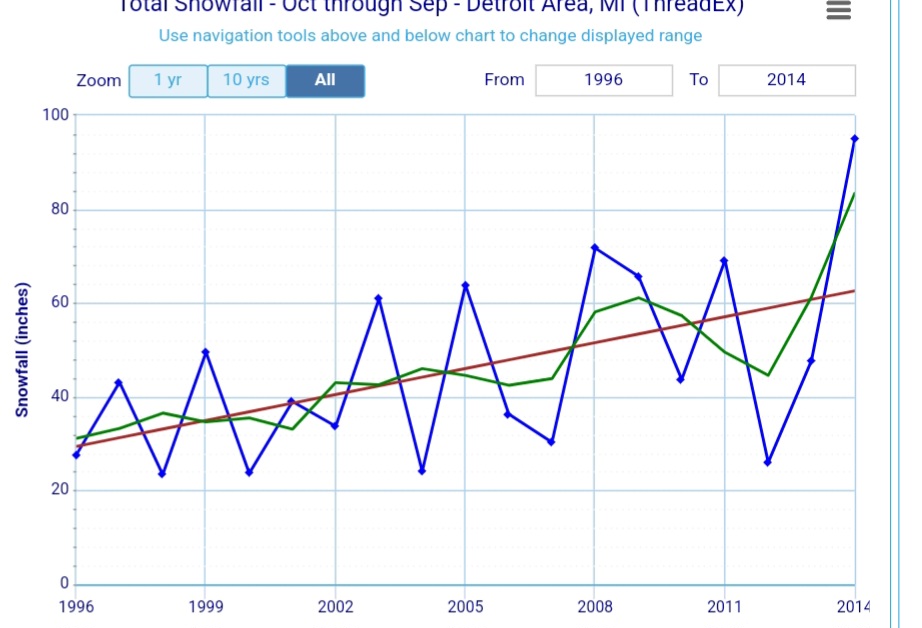-
Posts
17,088 -
Joined
-
Last visited
Content Type
Profiles
Blogs
Forums
American Weather
Media Demo
Store
Gallery
Everything posted by michsnowfreak
-

2025-2026 ENSO
michsnowfreak replied to 40/70 Benchmark's topic in Weather Forecasting and Discussion
I am the exact same! I love discussing weather data past/present, dont really care about cc. It has its place in weather discussion, but constant derailment of threads is annoying. Im actually quite satisfied with my climate overall, so I dont really care what happens in other countries or what not. But when I see stats (my weather speciality) being twisted, I call things out. Or the fact that any below average temp period now has to have some unexpected reasoning behind it lol. -

2025-2026 ENSO
michsnowfreak replied to 40/70 Benchmark's topic in Weather Forecasting and Discussion
It was 2nd coldest, only 1903-04 was colder. However, it was the all-time coldest for avg min temp (10.2F). It was a brutally cold winter, and 1875 is the coldest year on record. The unseasonable cold was so impressive all throughout 1875 that not only is it the coldest year on record at Detroit, but it is a full 1.5F COLDER than the 2nd coldest year on record. Though records began in 1870, there is unofficial data dating to the 1830s and 1875 is the coldest. And wouldnt you know, that a big warm spell ended the year, so the record high for Dec 31st is 65F....set in 1875. Just gotta love weather stats! -

2025-2026 ENSO
michsnowfreak replied to 40/70 Benchmark's topic in Weather Forecasting and Discussion
1944-45 was a very cold white winter than suddenly turned into record warmth in March, starting vegetation a month early, then April and May frosts/freezes destroyed the fruit crops, similar to (if not worse than) 2012. Actual snowfall numbers and technicalities aside, here 1942-43, 1944-45 & 1947-48 were very white winters and 1941-42, 1943-44, & 1948-49 were very bare winters. -

2025-2026 ENSO
michsnowfreak replied to 40/70 Benchmark's topic in Weather Forecasting and Discussion
A frozen, white, cold winter...with below avg snow. With 89 days of 1"+ snowcover, only 1903-04, 1977-78, and 2013-14 had more. So very impressive in that regard. But the peak depth was only 5". A New Years ice storm left a frozen tundra for weeks. The total snowfall was just 28.4". No other winter on record had so much snowcover with so little snowfall. Ive seen some cool pics of the Dec 26, 1947 storm at NYC. -
Loving the autumn-like weather this coming week!
-

2025-2026 ENSO
michsnowfreak replied to 40/70 Benchmark's topic in Weather Forecasting and Discussion
I have looked into some of the eastern winters of the 1940s to compare to the meek ones we had here, and Id have to say its probably the most different of any decade. Those winters sucked here. But I think a lot of it was due to dry weather and bad luck. Though there were some mild winters in the 1940s, the decade was easily colder than either the 1930s or the 1950s. But it sucked for snow. It is by far Detroits least snowiest decade on record (avg 28.7"). We had 3 major ice storms but no memorable snowstorms. In terms of the WWII years, 1942-43 was the best winter of the decade. 1944-45 was cold and white but very dry. 1941-42 and 1943-44 were very bare winters overall. -

2025-2026 ENSO
michsnowfreak replied to 40/70 Benchmark's topic in Weather Forecasting and Discussion
The climate has never been "stable" here and many other places. Stable is a place like San Diego or Barrow. As a matter of fact, Ive yet to see a more erratic grouping of winters than we had from 1875-1882 (see bottom). Just because the globe is warmer than it was, the actual climate was anything but stable from 1880 to 1870 here. The year-to-year and decade-to-decade variability always has and always will exist. If there is to be any longterm significant change in snowfall in the Great Lakes region, we will need a lot more years of data to come. Winter avg temp at Detroit (current avg is 28.4F for reference): 1874-75: 19.1F 1875-76: 31.0F 1876-77: 23.5F 1877-78: 31.5F 1878-79: 21.8F 1879-80: 32.5F 1880-81: 21.8F 1881-82: 37.0F (warmest on record to this day) -

2025-2026 ENSO
michsnowfreak replied to 40/70 Benchmark's topic in Weather Forecasting and Discussion
Its cherry picking because its a short time span. You realize that if any of the next several winters have above avg snowfall that regression line goes right back up at those places. -

2025-2026 ENSO
michsnowfreak replied to 40/70 Benchmark's topic in Weather Forecasting and Discussion
Yeah I wasnt denying the magnitude of March 2012, just for which areas were hardest hit. I think the duration of the cold in Feb 2015 was what was so impressive, not any individual number. Jan 2019 and even Jan 2024 had very impressive arctic blasts in areas which created some real low temps at places, but the months themselves were nothing impressive from a mean temp standpoint. -

2025-2026 ENSO
michsnowfreak replied to 40/70 Benchmark's topic in Weather Forecasting and Discussion
If you truly take an interest in climate change, thats fine. But your posts come across more troll-like than anything else. -

2025-2026 ENSO
michsnowfreak replied to 40/70 Benchmark's topic in Weather Forecasting and Discussion
Oh believe me, he doesnt stop there. He has an excuse for every warm or low snow record from the old days being wrong. The thermometers were placed wrong, the thermometers were inaccurate, it was more in the heart of a city (which probably had dirt roads), snowfall was measured wrong, snowfall has to be wrong because this station 30 miles away had more, etc etc etc. Depending on the day it can vary from annoying to actually entertaining. Funny thing for me, I was 12 in 1995, so my real interest in weather kicked into high gear when we had a real string of shit winters - 1993-94 through 1997-98 sucked for the most part. So while I know the east had an amazing 95-96, we did not, and I just have to LAUGH at the notion 1990s winters were better than 2000s-2010s because HERE at least, it wasnt even CLOSE. -

2025-2026 ENSO
michsnowfreak replied to 40/70 Benchmark's topic in Weather Forecasting and Discussion
There was extreme cold in Europe at the time, but not the U.S. -

2025-2026 ENSO
michsnowfreak replied to 40/70 Benchmark's topic in Weather Forecasting and Discussion
Yup. Which is why those of us in colder climates to begin with should be licking our chops at the POTENTIAL a wetter winter climate holds wrt snowy winters when the patterns are good. Cold is such a subjective word. Whats "cold" to one region is "mild" to another. But snow is snow. When we JUST lived through the snowiest stretch on record just over a decade ago, Im supposed to believe that a few lower snow winters (and here they have been just that - lower snow, nothing close to record low) are the point of no return. When I live surrounded by the Great Lakes? Sure, Jan. Similar case for new england with the ocean nearby. The inability to understand weather patterns and how patterns work is WILD when someone is trying to hammer in one single (often incorrect) argument lol. -

2025-2026 ENSO
michsnowfreak replied to 40/70 Benchmark's topic in Weather Forecasting and Discussion
Yes but you are referencing different regions that got a +10 departure. Its obviously impressive but its not like the same location is getting it every time. My comment was soley about Feb 2015. To say which was more impressive, Mar 2012 or Feb 2015, is like a pissing contest when in reality both months were extremely impressive. But Id consider it a pretty subjective argument over which was more impressive, at least in the areas that were impacted the hardest by both months (ie: the upper midwest). Here at Detroit, the departure in March 2012 was +13.5F and in February 2015 it was -13.9F. Both months departures were similar (with the edge actually going to Feb '15) but one way to look at it the other way, is that while March 2012 was nearly unheard of in its early warmth (a similar but ever so slighly less extreme warm spell occurred in Mar 1945), the actual temperatures (mid to upper 70s with 3 days of low to mid 80s) were not at all unheard of, just an incredible 1-2 months earlier than you would typically see a warm spell of that magnitude. On the other hand, February is already the dead of winter, the 2nd coldest month of the year on average, just slightly behind January. So when you add those departures into the dead of winter you get absolutely brutal cold. In 155 years of records, only Feb 1875, Jan 1912, Jan 1918, & Jan 1977 were colder. Furthermore, Detroit kind of was the national spotlight in 2013-14 due to the harsh winter, but that moved to Boston in 2015 with all the heavy snow. Rightly so, but while Boston was getting buried, the cold here was just brutal. We had deep snow on the ground, but it was the cold making daily headlines, often with them telling people not to go outside unless they had to with the wind chills. -

2025-2026 ENSO
michsnowfreak replied to 40/70 Benchmark's topic in Weather Forecasting and Discussion
Never underestimate the wild stuff he will post when you have a website like xmacis where you can literally plug in any data point to start/end at any given time, for any station. Even the most passionate CC posters know hes a joke. -

2025-2026 ENSO
michsnowfreak replied to 40/70 Benchmark's topic in Weather Forecasting and Discussion
But as we all know, he has a one track agenda and its not swayed under any circumstances. Using a regression line is great for a long period of time, but for short periods its nothing more than cherry picking data points to support your agenda. Xmacis makes this super easy for him. Like I posted earlier, I can do the same thing by picking data points. What do you know, Detroits snowfall increased from the 30s to the 60s from 1996 to 2014 . Of course a regression line at Boston starting in 1990 will be down after the past several low winters which followed record snow in the 2010s. Its a completely pointless and errant argument from a troll. Remember, this latest posting spree of him talking to himself began with him telling bluewave that lowering coastal snowfall jives with his memory (even tho he doesnt live on the east coast) because he remembers "winters of his childhood (1990s) were WAY snowier". After which he was called out by showing that snowfall in Pittsburgh (nearest first order site to where he lives) was much higher in the 2010s than the 1990s. -
What conditions caused the dust storm? I didn't hear about it til after the fact. We had nothing here.
-

Spring 2025 Medium/Long Range Discussion
michsnowfreak replied to Chicago Storm's topic in Lakes/Ohio Valley
My thoughts exactly. He can have as many posting handles as he wants, he gives himself away every single time. -
The cool autumn like breeze today feels amazing!
-

2025-2026 ENSO
michsnowfreak replied to 40/70 Benchmark's topic in Weather Forecasting and Discussion
You brought up the +15° departures in the upper midwest in March 2012 but left out the -15° departures in the same region in February 2015. Then again, most of your analysis is nyc-based, which is fine, but it doesn't necessarily jive with other regions. We circle this discussion constantly lol. Since the hustoric stretch of winters ended in 2015, winters have trended much milder, but we've seen some record cold arctic blasts and heavy snow months as well. Then of course last winter threw everyone for a loop by being much, much colder than expected. I honestly can't wait to see what next winter brings. -

2025-2026 ENSO
michsnowfreak replied to 40/70 Benchmark's topic in Weather Forecasting and Discussion
No need to feed the troll. 2013-14 wasn't just a good winter here, it was literally the most severe winter in recorded history. -
Oh I agree! I dont like the warmth either. I just meant considering the 90s for days to our west, squeezing into the low 80s was nothing here
-
83 is gonna do it for the high at DTW for this warm spell, nothing at all to write about in the eastern Lakes. Now unseasonable chill awaits.
-

2025-2026 ENSO
michsnowfreak replied to 40/70 Benchmark's topic in Weather Forecasting and Discussion
I know right!? It's the same song and dance shtick with him in every forum. It's not about CC anyway, it's about his extremist and wild agenda. Hes been called out and ignored on every subforum. He comments on a post about lowering snowfall on the I95 east coast by saying its correct he "remembers" winters were "much snowier" when he was a kid (1990s) by posting a chart of Cleveland snowfall, a place impacted by LES & one which he didn't live anywhere near as a kid. Called out his BS cherry pick by noting how nearly all major cities near Cleveland had LESS snow in the 1990s than recent decades, and he proceeds to post linear regression stats for random cities. And more of his talking to him self posting sprees. Obvious linear regression charts for small time frames will have huge impacts if the past few winters had lower snow. Same joke, different day lol. Look at the snowfall regression at Detroit from 1996 to 2014, when you start at an unusually low winter and end at a record high winter. I guess my average went from the 30s to the 60s inches from the 1990s to 2010s lol. -
Though it likely wont last the month, crazy that International Falls has a higher May mean temp than Detroit. DTW is now a low-humidity 82F, so today will be the hottest day of this warm week where everything impressive temp-wise hit to our north and northwest.





